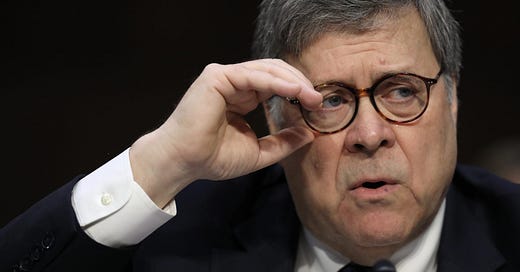William Barr Won't Recuse Himself From the Mueller Investigation. Good.
The independent streak Barr showed during his confirmation hearings will serve him well as he navigates the conclusion of the lengthy special counsel probe.
The Justice Department announced Monday evening that attorney general William Barr will not recuse himself from special counsel Robert Mueller’s investigation of Russian election meddling, following the determination of senior career ethics officials that he should not do so. Fox News further reports that while Barr will assume control of the investigation, he plans to continue to use Deputy Attorney General Rod Rosenstein, who oversaw the probe during Jeff Sessions’ tenure as attorney general, as the Justice Department’s primary liaison to Mueller’s office.
All of this should put to rest any lingering concerns congressional Democrats might have about Barr’s handling of the Mueller investigation. The judgment of DoJ ethics officials places Barr on firm ground as he prepares to brace the Department of Justice against the coming hurricane that will be the end of the probe. Further, Barr’s decision to keep Rosenstein’s role largely unchanged is a sign that he is likely to handle that storm with prudence.
During Barr’s confirmation hearings before the Senate Judiciary Committee, Democrats repeatedly tried to extract promises from Barr that he would recuse himself from the Mueller investigation if ethics officials advised him to do so. Barr repeatedly responded that he did not believe he would be asked to recuse, but also stubbornly refused to make a promise that he argued would unduly restrict the lawful powers of the position.
“I will seek the advice of the career ethics personnel, but under the regulations, I make the decision as to the head of the agency as to my own recusal,” he told Patrick Leahy. Later, to Mazie Hirono, he said that “I’m not going to surrender the responsibilities of the attorney general to get the title. I don’t need the title.”
At the time, Barr’s refusal to commit to following the advice of ethics officials was widely characterized as a dodge, fueling a left-wing outcry that he was a Trump stooge trying to slip by the committee. Now that his prediction that he would not be asked to recuse himself has proved accurate, however, so his decision not to provide particular promises to Congress beyond his pledge to follow and uphold the rule of law has been vindicated. The same independent streak that kept Barr from currying favor with the committee should serve him well as he enters the administration of a president who barely bothers to hide his desire for the Justice Department to serve as his political attack dog.
It is crucial in the days ahead that Barr establish himself as a fiercely independent attorney general crucial in the days ahead, and never more so than when the Mueller report is finally submitted. As the official charged with determining how much of that report to declassify, Barr is sure to be a target of whichever party Mueller’s findings disappoint.
There remains more that Congress could do to help avoid that scenario, of course. Passing the Special Counsel Transparency Act, which Sens. Richard Blumenthal and Chuck Grassley introduced earlier this year, would ensure that Mueller’s full findings are released to Congress, further preventing anyone from accusing Barr of tampering with the results. In the meantime, however, anyone who follows the Russia probe should be reassured by Monday’s news.











